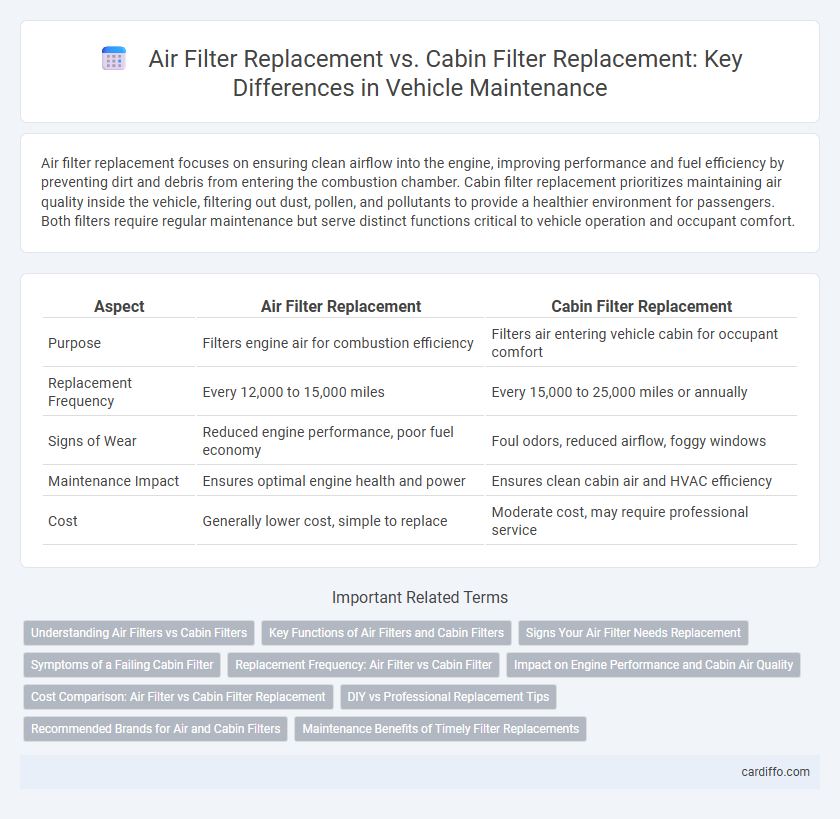Air filter replacement focuses on ensuring clean airflow into the engine, improving performance and fuel efficiency by preventing dirt and debris from entering the combustion chamber. Cabin filter replacement prioritizes maintaining air quality inside the vehicle, filtering out dust, pollen, and pollutants to provide a healthier environment for passengers. Both filters require regular maintenance but serve distinct functions critical to vehicle operation and occupant comfort.
Table of Comparison
| Aspect | Air Filter Replacement | Cabin Filter Replacement |
|---|---|---|
| Purpose | Filters engine air for combustion efficiency | Filters air entering vehicle cabin for occupant comfort |
| Replacement Frequency | Every 12,000 to 15,000 miles | Every 15,000 to 25,000 miles or annually |
| Signs of Wear | Reduced engine performance, poor fuel economy | Foul odors, reduced airflow, foggy windows |
| Maintenance Impact | Ensures optimal engine health and power | Ensures clean cabin air and HVAC efficiency |
| Cost | Generally lower cost, simple to replace | Moderate cost, may require professional service |
Understanding Air Filters vs Cabin Filters
Air filters primarily protect the engine by filtering out dust, pollen, and debris from the air entering the engine, ensuring optimal combustion and performance. Cabin filters focus on improving air quality inside the vehicle by trapping pollutants like pollen, mold spores, and dust, enhancing passenger comfort and health. Understanding the distinct roles of engine air filters versus cabin air filters is crucial for maintaining both vehicle efficiency and interior air quality.
Key Functions of Air Filters and Cabin Filters
Air filters primarily protect the engine by trapping dust, dirt, and debris from incoming air, ensuring optimal combustion and preventing engine damage. Cabin filters focus on improving air quality inside the vehicle by filtering pollen, pollutants, and allergens from the air entering the passenger compartment. Regular replacement of both filters is essential to maintain engine performance and provide a healthy cabin environment.
Signs Your Air Filter Needs Replacement
A dirty or clogged air filter reduces engine performance, causes decreased fuel efficiency, and often triggers the check engine light. Noticeable symptoms include unusual engine sounds, sluggish acceleration, and black smoke from the exhaust, indicating restricted airflow. Regular inspection every 12,000 to 15,000 miles or according to the manufacturer's recommendation ensures optimal vehicle operation.
Symptoms of a Failing Cabin Filter
A failing cabin filter commonly causes reduced airflow from the HVAC system, unpleasant odors, and increased dust or allergens inside the vehicle. Symptoms include foggy windows due to poor ventilation and unusual noises like whistling when the fan is running. Timely cabin filter replacement improves air quality and prevents HVAC system strain, enhancing passenger comfort and safety.
Replacement Frequency: Air Filter vs Cabin Filter
Air filters typically require replacement every 12,000 to 15,000 miles to ensure optimal engine performance and fuel efficiency, while cabin filters usually need changing every 15,000 to 25,000 miles to maintain air quality inside the vehicle. Factors such as driving environment, exposure to dust, and air pollution can influence these intervals, often necessitating more frequent cabin filter replacements in urban or dusty areas. Regularly monitoring both filters and adhering to manufacturer recommendations prevent reduced airflow, allergens buildup, and compromised engine operation.
Impact on Engine Performance and Cabin Air Quality
Replacing the air filter directly improves engine performance by ensuring optimal airflow and preventing dirt and debris from entering the engine, which enhances fuel efficiency and power output. Cabin filter replacement primarily impacts cabin air quality by filtering out pollutants, allergens, and dust, creating a healthier and more comfortable environment for passengers. Neglecting either filter can lead to decreased engine efficiency or compromised air quality, emphasizing the importance of regular maintenance for both components.
Cost Comparison: Air Filter vs Cabin Filter Replacement
Air filter replacement typically costs between $20 and $75, while cabin filter replacement ranges from $30 to $90 depending on vehicle make and model. Labor costs for both filters are generally low, often under an hour, but cabin filters may involve higher prices due to their location inside the vehicle's HVAC system. Choosing air filter replacement offers slightly lower expenses, but cabin filters are essential for interior air quality and may justify the modestly higher cost.
DIY vs Professional Replacement Tips
Air filter replacement is often a straightforward DIY task, as it typically involves removing and installing a single easily accessible component, while cabin filter replacement can be more complex due to its location behind the glove box or under the dashboard, which may require specific tools. Professional replacement ensures proper inspection for other potential air system issues and guarantees the correct fitment, especially for cabin filters that impact air quality. Utilizing manufacturer guidelines and noting filter specifications like MERV ratings can optimize performance and longevity whether completed independently or by a technician.
Recommended Brands for Air and Cabin Filters
Commonly recommended brands for air filter replacement include K&N, Fram, and Mann-Filter, known for their high filtration efficiency and durability in engine air intake systems. For cabin filter replacement, trusted brands like Bosch, AC Delco, and EPAuto excel at improving interior air quality by effectively capturing allergens, dust, and pollutants. Selecting filters from these reputable manufacturers ensures optimal vehicle performance and healthier cabin environments.
Maintenance Benefits of Timely Filter Replacements
Timely air filter replacement ensures optimal engine performance by preventing dust and debris buildup, which improves fuel efficiency and reduces emissions. Replacing the cabin filter regularly enhances air quality inside the vehicle, reducing allergens and pollutants for a healthier driving environment. Both maintenance actions extend the lifespan of HVAC systems and prevent costly repairs by maintaining proper airflow and filtration.
Air Filter Replacement vs Cabin Filter Replacement Infographic

 cardiffo.com
cardiffo.com